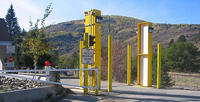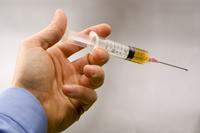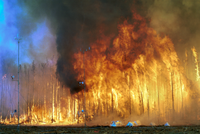-
GAO: $4 billion border radiation detectors program a bust

The Government Accountability Office (GAO) reported Wednesday that the $4 billion program to install radiation detectors at U.S. border crossings yielded few tangible results; the detection machines were too big for border inspection lanes, and the software for the Cargo Advanced Automated Radiography Systems also was not up to the task; DHS: “We are mindful of getting something delivered that has a credible basis for the implementation plan that follows”
-
-
Pentagon shifts $1 billion from WMD-defense efforts to vaccine development

The Obama administration has shifted more than $1 billion out of its nuclear, biological, and chemical defense programs to underwrite a new White House priority on vaccine development and production to combat disease pandemics; Defense Department projects under the budget-cutting ax include the development and acquisition of biological and chemical detection systems; gear to decontaminate skin and equipment after exposure; systems to coordinate military operations in a chem-bio environment; and protective clothing for military personnel entering toxic areas, the document indicates
-
-
Rapiscan in $12 million nuclear detection contract
DHS’s Domestic Nuclear Detection Office (DNDO) has contracted Rapiscan Systems for detection of shielded nuclear materials; the company has been tasked with developing a Liquefied Noble gas detector — in collaboration with Yale University — a threshold activation detector, a human portable system, and an aircraft inspection solution
-
-
U Rochester lands $15 million to study medical response to nuclear terrorism
Research has revealed that it is not just the immediate effect of radiation that makes adults and children sick; rather, the radiation damage can remain relatively undetected in key tissues and organs, but will trigger life-threatening illnesses after an injury that occurs later; new project places the University of Rochester Medical Center firmly in a leadership position in the counterterrorism effort
-
-
Wild fires in Russia may shower region with Chernobyl-era radioactive particles

Large forested areas in Bryansk were contaminated when the Chernobyl nuclear power plant’s Reactor No. 4 exploded during a pre-dawn test on 26 April 1986, spewing radioactive clouds over much of the western Soviet Union and northern Europe; radioactive particles settled into the soil, and environmentalists have warned that they could be thrown up into the air once again by wildfires and blown into other areas by the wind; the death rate in Moscow has doubled to 700 people a day
-
-
U.S. nuclear weapons detection skills, capabilities deteriorate
The world is increasingly worried about nuclear weapons proliferation, so it is not good to read that a National Research Council (NRC) report warns of “concerns” over deteriorating U.S. expertise in detecting and investigating nuclear weapons; the shortage of nuclear forensics specialists could have dire consequences says the NRC: “Beyond the terrible loss of life, which in itself is difficult to appreciate fully, the successful detonation of one or more nuclear explosives in a U.S. city and the potential for more detonations could transform our nation into a national security state, focused on common defense to the detriment of the justice, general welfare, and blessings of liberty envisioned by our nation’s founders”
-
-
Many ways to smuggle nukes into the United States
The United States focuses on scanning shipping containers for nuclear smuggling; with nearly 10 million cargo containers arriving in the United States by sea or on land each year, this is a difficult task; the GAO says this is not enough, and that the government must find ways to keep an eye on 13 million recreational boats and 110,000 fishing vessels which go in and out U.S. sea ports — and also on freight trains, which are often more than three kilometers long
-
-
China's nuclear reactors to use technology rejected by U.S., U.K. as unsafe
Ten of China’s proposed nuclear power reactors will use Westinghouse’s AP1000 advanced technology; the United States rejected the AP100 design, saying key components of the reactormight not withstand events like earthquakes and tornadoes; the United Kingdom indicated it, too, would reject Westinghouse’s new reactor because it could be vulnerable to terrorist attacks
-
-
U.S. has no plan to keep nuclear bomb materials from crossing border
In 2006 the George W. Bush administration announced a $1.2 billion project to deploy thousands of scanners for screening vehicles and cargo at U.S. ports to block the importation of radioactive materials that could be used to make a bomb to protect the United States; the scanners — known as the advanced spectroscopic portal (ASP) machines — proved a failure, and in February, following one setback after another, officials abandoned full-scale deployment of the machines; GAO says that the attention and resources invested in the ill-fated ASPs delayed the creation of a “global nuclear detection architecture” to protect the United States
-
-
Political summits should be held in remote locations
Canadian security expert says that holding the G8 summit in Toronto makes no sense; bringing world leaders to an urban setting escalates cost — and risk; “it is overwhelmingly easier to get a device such as a powerful dirty bomb into Toronto than it would have been into Kananaskis [Alberta],” where the 2002 G8 summit was held
-
-
U.S. lab center of information gathering effort in the event of nuclear terror
In a laboratory on the edge of the vast Nevada desert, U.S. officials would gather some of the first critical information that could affect the lives of millions in the aftermath of a nuclear terrorist attack in an American city
-
-
UN: Iran has fuel for two nuclear weapons
IAEA says Iran has enough nuclear fuel for two nuclear weapons; the toughly worded IAEA report says that Iran has expanded work at one of its nuclear sites; it also describes, step by step, how inspectors have been denied access to a series of facilities, and how Iran has refused to answer inspectors’ questions on a variety of activities, including what the agency called the “possible existence” of “activities related to the development of a nuclear payload for a missile”
-
-
Bureaucratic hurdles delay NYC dirty bomb defenses
NYPD says that since last fall, it has been trying to obtain an $8 million federal grant for a radiation detection system which would instantly read data from 4,500 sensors in cop cars across the region to intercept vehicles carrying explosive devices; NYPD is still waiting
-
-
U.K. firm investigated over sale of dirty bomb material to Iran
British company sells cobalt aluminate; the material can be used to produce alloys as well as the lethal radioactive isotope cobalt 60; for this reason its sale to nations like North Korea and Iran is tightly limited; cobalt is considered by nuclear experts as more likely to be used in a dirty bomb than in a nuclear warhead
-
-
The threat of nuclear terrorism against Israel
Former Israeli deputy national security adviser writes that the threat of nuclear terrorism Israel faces may be more likely to materialize than an Iranian nuclear attack on Israel — should Iran acquire nuclear weapons; he recommends a staunch and uncompromising deterrence policy, based on “retaliate first, no questions asked” — and a study of potential targets of high value to al Qaeda and other terrorist organizations which would be destroyed in a retaliatory attack
-
More headlines
The long view
Keeping the Lights on with Nuclear Waste: Radiochemistry Transforms Nuclear Waste into Strategic Materials
How UNLV radiochemistry is pioneering the future of energy in the Southwest by salvaging strategic materials from nuclear dumps –and making it safe.
Model Predicts Long-Term Effects of Nuclear Waste on Underground Disposal Systems
The simulations matched results from an underground lab experiment in Switzerland, suggesting modeling could be used to validate the safety of nuclear disposal sites.
